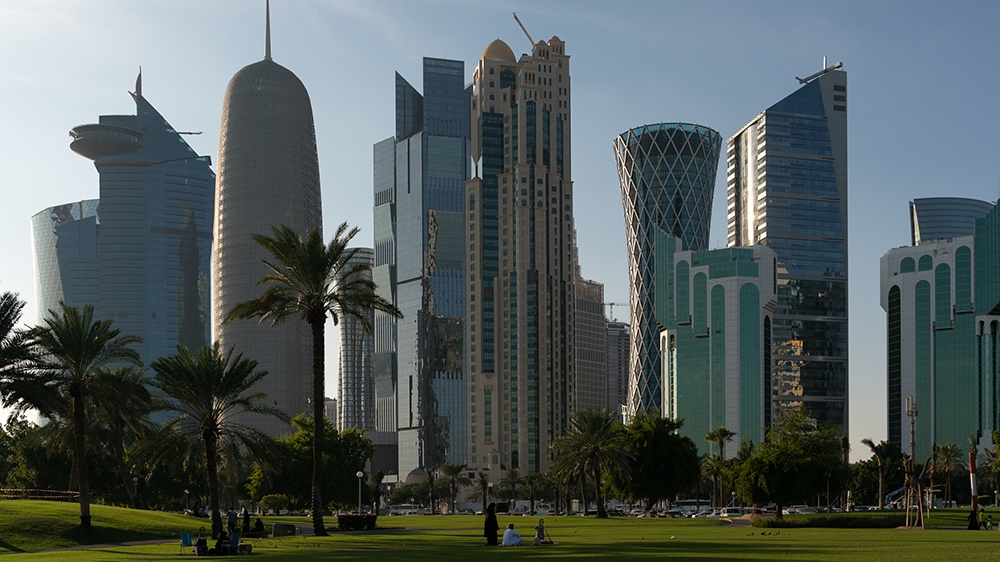
The three-year blockade of Qatar by neighboring Arab nations dragged on for too long and threatens regional security and prosperity, a US envoy said.
United States Special Representative for Iran Brian Hook on Sunday acknowledged the challenge before ending the crisis that has torn the Gulf Cooperation Council (GCC) with the United Arab Emirates (UAE), Saudi Arabia, and Bahrain part of the siege.
Egypt also joined the blockade, which saw nations close their airspace and borders with Qatar in June 2017.
Kuwait and Oman, the other two nations in the GCC, have since sought dialogue between the countries, with Emir Sheikh Sabah Al Ahmad Al Sabah of Kuwait leading those efforts.
So far, the United States has tried unsuccessfully to mediate in the dispute, which Washington sees as a threat to efforts to contain Iran.
“The dispute has continued for too long,” Hook told Doha journalists after meeting with Qatar Foreign Minister Sheikh Mohammed bin Abdulrahman Al Thani.
“Ending this dispute will really advance the collective interests of all parties to this conflict.”
‘Steps back’
Gulf diplomats and sources told Reuters news agency that the United States has been trying to convince Saudi Arabia and its allies to reopen its airspace, but mediation efforts since the beginning of 2020 have yet to bear fruit.
Hook said he planned to travel to Kuwait City on Monday to meet with officials there and discuss the matter.
“I’ve seen a few steps back in the past few years,” Hook said. “We have reached points where I think both sides were optimistic and we have reached points where both sides were pessimistic.”
“I believe that our role and that of Kuwait is to do what we can to foster dialogue, help them progress.”
The four countries cut ties with Qatar on June 5, 2017, just after a summit in Saudi Arabia in which the Gulf leaders met with the President of the United States, Donald Trump. They accuse Qatar of supporting “extremist groups” in the region, charges denied by Doha.
Included in their claims are the closure of a Turkish military base in Qatar and the closure of the Al Jazeera media network.
The quartet has also noted Qatar’s close relationship with Iran, with which it shares an enormous offshore gas field that provides the peninsular nation with its vast wealth. Qatar reestablished full diplomatic ties with Iran amid the dispute.
Hook said the hospitalization of the 91-year-old Kuwaiti ruler “would have no negative effect on diplomatic efforts” to end the blockade. Sheikh Sabah, who is in the United States receiving medical treatment, has long tried to end the siege.
The United States envoy said he believed Sheikh Sabah, a longtime diplomat, would want the Kuwaiti efforts to continue.
Iran arms embargo
Hook is in the Middle East to urge the extension of a United Nations arms embargo against Iran. Washington is trying to extend the embargo warning ruling “would intensify” regional conflicts.
“I have spoken to leaders here in the Gulf and around the world; no one believes that Iran can freely buy and sell conventional weapons such as combat aircraft … and various types of missiles,” Hook said.
The United States has urged the UN Security Council to extend the embargo that expires in October. The extension is opposed by the veto of Russia and China, which can obtain major arms contracts from Iran.
“If the Security Council does not extend the arms embargo before October 18, Iran will be able to freely buy and sell these weapons,” Hook said. “Imagine what the region will look like if this happens, conflicts in places like Syria and Yemen will certainly escalate.”
The American arch-enemy Iran is a key player on the Syrian government’s side in the country’s conflict, and is aligned with the Houthi rebels in Yemen who are fighting the government, supported by a coalition led by the US ally Saudi Arabia.
Iran has vehemently opposed any extension of the arms embargo. Last month chancellor Mohammad Javad Zarif called the The Trump administration “an illegal stalker” who is waging “economic terrorism” in his country.
If the U.S. fails to extend the arms embargo, it has threatened to trigger the return of all UN sanctions on Iran under the landmark 2015 nuclear deal, from which Washington unilaterally withdrew in 2018.
.